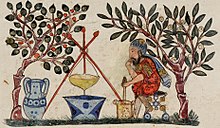Preparation[edit]
Medicinal plants are often tough and fibrous, requiring some form of preparation to make them convenient to administer. According to the Institute for Traditional Medicine, common methods for the preparation of herbal medicines include decoction, powdering, and extraction with alcohol, in each case yielding a mixture of substances. Decoction involves crushing and then boiling the plant material in water to produce a liquid extract that can be taken orally or applied topically.[80] Powdering involves drying the plant material and then crushing it to yield a powder that can be compressed into tablets. Alcohol extraction involves soaking the plant material in cold wine or distilled spirit to form a tincture.[81]
Traditional poultices were made by boiling medicinal plants, wrapping them in a cloth, and applying the resulting parcel externally to the affected part of the body.[82]
When modern medicine has identified a drug in a medicinal plant, commercial quantities of the drug may either be synthesised or extracted from plant material, yielding a pure chemical.[34] Extraction can be practical when the compound in question is complex.[83]
You received this message because you are subscribed to the Google Groups "1TopReadys1" group.
To unsubscribe from this group and stop receiving emails from it, send an email to 1topreadys1+unsubscribe@googlegroups.com.
To view this discussion on the web visit https://groups.google.com/d/msgid/1topreadys1/CAEXU47UV4X6UvziXHvGTABiJadBmUa1GOjA0y0rq_1HC9FieBA%40mail.gmail.com.

No comments:
Post a Comment